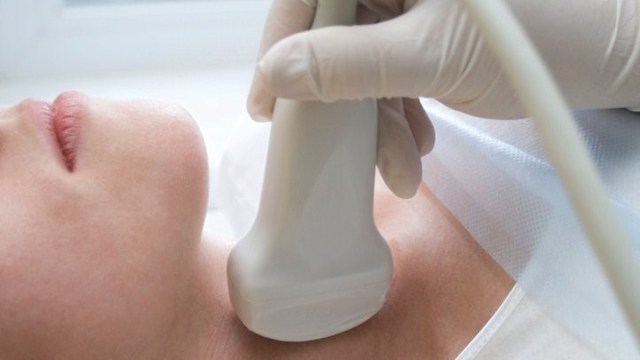 iStockphoto/Thinkstock
iStockphoto/Thinkstock
In a recent conversation I had with an Ob/Gyn, she mentioned her belief in the necessity of having a thyroid shield when getting a mammogram. I made a mental note of it, and decided it was worthy of further assessment. When I went for my test, I mentioned it to the technician.
A doctor came in to explain that it wasn’t necessary — but that was the extent of her feedback. As a strong supporter of patient advocacy, I decided the topic needed some further investigation. Little did I know that Dr. Mehmet Oz had started a brouhaha on this subject in 2010.
After numerous interviews, I learned why thyroid shields were not necessary. In fact, they were considered a detriment to the mammogram process. I came out with a very different perspective than I had going in.
I spoke by telephone with Dr. Debra Monticciolo, the Chair of the Commission on Quality and Safety at the American College of Radiology and the President of the Society of Breast Imaging. Straight off, she told me emphatically that a shield impedes a good mammogram.
She said, “Use of a thyroid shield in not recommended. It can interfere with a high quality mammogram by getting in the way of positioning, interfering with compression (which is needed for a good exam), and sometimes the shield itself covers breast tissue that we need to see.”
I questioned her as to whether there were any other hidden issues that might influence her position.
She responded, “Radiologists want to find cancers at their earliest possible stage. We want to help our patients and we know that mammography saves lives. The thyroid shield is not only unnecessary, but can prevent a woman from getting a good mammogram.”
Monticciolo added that her whole career was devoted to decreasing the effects of cancer. She pointed out, “Women should know that the radiation exposure to the thyroid that occurs during the mammogram is so tiny that it is hard to measure. It is not worrisome to a woman’s health.” Monticciolo said that her stance was based on science.
The American College of Radiology, the Society of Breast Imaging, and the American Thyroid Association all concur that a shield is not advisable. http://www.thyroid.org/wp-content/uploads/2012/06/ATA_Policy_Statement_June_2012.pdf
The ACR and Society of Breast Imaging released a statement outlining that not only is the radiation dose to the thyroid from a mammogram very low, it is also not direct. The scattered amount is “equivalent to only 30 minutes of natural background radiation received by all Americans from natural sources.”
Monticciolo shared an article, Mammography and the Risk of Thyroid Cancer which showed images of a mammogram of a breast with and without a thyroid shield. It was obvious that the image with the shield was lacking in tissue detail and contrast.
So how is this being played out in treatment around the country? Some doctors feel it is a conversation that doesn’t need to take place. Shawn Farley, the Director of Public Affairs at the American College of Radiology told me that his organization had created guidelines in response to questions that were being raised about the use of thyroid shields.
He said, “We went to a great deal of effort to distribute this to our members, the media, patient sites and other health professionals — and encouraged them to use this guidance in communicating with women who receive mammograms.”
He noted that practitioners have “varying individual communications skills.” He expressed the hope that “doctors, technologists and allied health professionals” were using the information to communicate with the women they served.
Dr. Stacey Vitiello , a breast Imaging and biopsy specialist at
Montclair Breast Center, sent me her thoughts via e-mail. I was still questioning why thyroid shields weren’t a topic for discussion prior to a breast exam.
She responded, “This issue received wide media attention when Dr. Mehmet Oz highlighted a study showing a significant increase in thyroid cancer in the United States since 1998. He theorized that this increased incidence is due to radiation exposure to the thyroid gland during annual screening mammography. In my opinion, it is highly unlikely that mammography can be blamed for this increased incidence, as the increase is seen equally in both women and men, and men do not receive screening mammograms. A recent scientific paper estimated that the lifetime risk for thyroid cancer resulting from annual screening mammograms is 1 in 17.8 million. In light of these factors, I do not believe that thyroid shields are necessary during a mammogram, or that the issue requires discussion with patients prior to their test.”
However, Vitiello did succinctly address a patient’s right to be informed in her following paragraph. She wrote, “That being said, we have agreed at Montclair Breast Center that if a patient expresses concern regarding her thyroid exposure, she is given the option of wearing a lead thyroid shield around her neck while her mammogram is performed (The shields are readily available in all of the mammo rooms.). Rarely, this shield interferes with the mammogram picture, and the image has to be re-taken. We believe that if a patient has peace of mind and a better mammogram experience by protecting her thyroid gland, then there is no legitimate reason that she shouldn't be given the opportunity to do so. There are many practices [offices] that would actively discourage women from wearing a shield, as it is not considered the 'standard of care', or they would not have one available if a women requests it. In my view, this approach disempowers the patient, and disrespects her concerns.”
The American Association of Physicists in Medicine has stated that the use of thyroid shields during mammography “could result in unnecessary increases in breast dose due to repeated mammography exams.”
However, the bottom line remains giving a woman a complete explanation of thyroid shields and the mammogram process, thereby letting her make her own decision.
Interviews:
Dr. Debra Monticciolo November 19, 2012
Shawn Farley November 19, 2012
Dr. Stacey Vitiello November 20, 2012
Reviewed November 28, 2012
by Michele Blacksberg RN
Edited by Jody Smith




Add a CommentComments
There are no comments yet. Be the first one and get the conversation started!